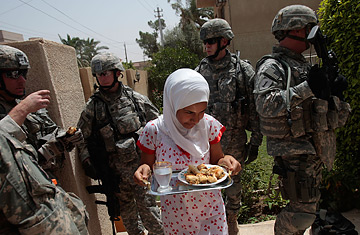
An Iraqi girl serving pastries to US troops in Baghdad.
The reversal was stunning, though little noticed. On June 13, three days after extremists bombed the sacred Shi'ite shrine in Samarra, cleric Moqtada al Sadr called for a mass march on the city by Shi'ites. Shi'ites shall make a pilgrimage to Samarra the first week of July, he declared, and defend the shrine.
American troops and Iraqi security forces in Samarra hardly knew what to do. Already Sunni extremists were unleashing daily attacks in Samarra and on the roads around the city. What would they do to a column of Shi'ite pilgrims heading into the city, with perhaps Sadr himself at the head? The scene would be the kind of chaos in Iraq that sometimes leaves hundreds dead.
Appeals to Sadr went up from Baghdad. Lawmakers, government officials and prominent Sunni figures urged him to reconsider. At least postpone, they said; to do this now invites disaster. Days passed. Tensions rose. Then, on June 29, Sadr issued word from his home mosque Kufa. The march will be put off, Sadr said, since the road to Samarra is too unsafe to travel.
Sadr's move effectively stopped another bloody tragedy from unfolding in Iraq and even seemed to crack the door on sectarian reconciliation, marking some of the first good news to surface in Iraq for some time. Recent days have brought other signs of progress for the country, even amid persisting scenes of violence and desperation that make up daily life here.
Civilian deaths in Iraq dropped 36% in June, according to statistics made public by the Ministry of Interior. Violence across Iraq last month left at least 1,227 civilians dead, the ministry said. In May, the figure was 1,949. The trend seems to suggest that the influx of U.S. troops to Iraq has put militants on the run to some degree. U.S. forces say they control roughly half of Baghdad's neighborhoods, whereas earlier they acknowledged that up to three-fourths of the capital was beyond their reach.
And Tuesday Iraqi Prime Minister Nouri al-Maliki said his cabinet had finally approved a draft of a new revenue-sharing oil law the White House sees as a key to reconciliation. The announcement came as a surprise after the measure had languished for months amid intense fighting among factions representing Iraq's Kurds, Shi'ites and Sunnis.
To be sure, the fate of the oil law remains uncertain as Iraq's parliament gets set to debate the legislation. It may stall like other political initiatives pressed by Washington, such as provincial elections and sectarian reconciliation. And violence may rise again. Sadr ordered a postponement, not an abandonment, of the march on Samarra. And the possibility of some terrible carnage in Iraq is always near. A few bad days of car bombings and murders could easily raise the civilian death toll in Iraq to numbers high enough to erase the gains. But for those watching Iraq's situation closely, even small and potentially ephemeral signs of progress are worth taking note of as the September deadline for the military's situation report nears.
